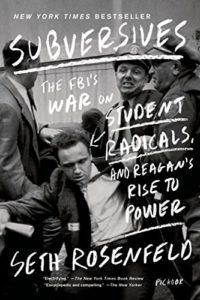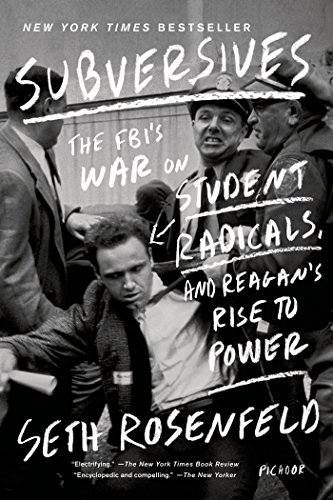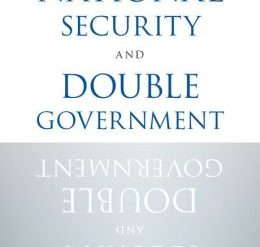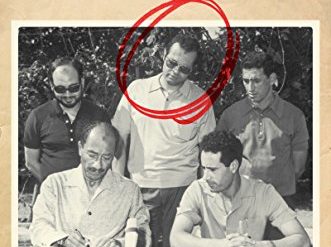
We’ve known for some time that the FBI and Ronald Reagan’s gubernatorial administration were involved in the sometimes-violent conflicts in 1960s Berkeley. What we didn’t know—or, at least, what I didn’t know—was that J. Edgar Hoover and Ronald Reagan were personally and directly engaged not just in monitoring but in managing the secret government campaigns that helped raise the temperature to the boiling point again and again. Seth Rosenfeld’s exhaustively researched recent book, Subversives, documents this story in often minute detail yet manages to keep it eminently readable.
Anyone who lived through those times as a sentient adult will surely remember some of the seminal events: the protest against the House Un-American Activities Committee in 1960, lodged in memory through the iconic footage of students being fire-hosed down the steps of San Francisco City Hall; the 1964 Free Speech Movement that pushed the University of California at Berkeley into the forefront of student protest, brought Mario Savio to prominence, and began to change public attitudes about the police; the 1965 Vietnam Day Teach-In that fastened students’ attention on the escalating U.S. war in Vietnam and initiated the public’s disillusionment with the U.S. government; and the violent clash over People’s Park in 1969, which led to the death of young James Rector and confirmed in so many minds the view that law enforcement officials were out of control.
Subversives: The FBI’s War on Student Radicals, and Reagan’s Rise to Power by Seth Rosenfeld (2012) 753 pages ★★★★★
Subversives breaks new ground in several ways because of Rosenfeld’s dogged, three-decade pursuit of classified government files that cast new light on the events themselves as well as the major players whose decisions drove them. The author keeps the story from getting out of hand by maintaining a tight focus on Hoover, Reagan, Savio, and UC Berkeley President Clark Kerr.
The little-known story of Ronald Reagan and J. Edgar Hoover’s responsibility for the violence in 1960s Berkeley
In Subversives, Rosenfeld relates the roles (hitherto largely undocumented) of J. Edgar Hoover and Ronald Reagan in these familiar events, demonstrating the ruthlessness with which both men pursued “Communists” and their lack of respect for the truth. We see Hoover aggressively pushing his agents to seek out embarrassing personal details — largely rumors — about Mario Savio, Clark Kerr, and their collaborators, illegally passing the information along to Right Wing publications, and later citing it as documented truth in reports to the President and to the public.
We see Reagan eagerly seeking out the FBI to inform on his rivals in Hollywood and secretly naming names behind closed doors with HUAC, destroying the careers of talented actors, directors, and writers because he disagreed with their political beliefs. From a vantage-point of half a century, both men appear to be thoroughly unscrupulous and careless about the sometimes tragic consequences of the action they directed from their privileged positions.
Seth Rosenfeld, a winner of the coveted George Polk Award and now a staff member of the Berkeley-based Center for Investigative Reporting, was previously an investigative reporter for the San Francisco Examiner and the San Francisco Chronicle.
For more reading
You’ll find this book on The 40 best books of the decade from 2010-19.
This is also one of the many Good books by Berkeley authors reviewed on this site.
For more books like this one, check out Top 10 nonfiction books about politics. This one is on the list.
You may enjoy browsing through 20 top nonfiction books about history.
For more good books on the history of the US, see Top 20 popular books for understanding American history.
And you can always find my most popular reviews, and the most recent ones, plus a guide to this whole site, on the Home Page.


























